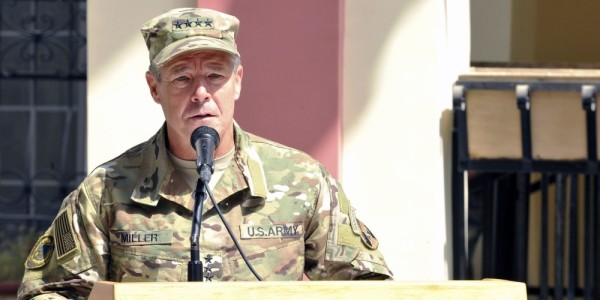

News from Afghanistan rarely gets reported by U.S. media outlets, which are more concerned about which videogame character the president’s penis supposedly looks like. But a catastrophic shooting in Kandahar on Thursday managed to break through the media’s malaise.
Army Brig. Gen. Jeffrey Smiley was wounded on Thursday, when a gunman killed at least two Afghan officials, including Lt. Gen. Abdul Raziq, a police chief and vital U.S. ally in Afghanistan whose loss is a real gut punch. Army Gen. Scott Miller, the top U.S. commander in Afghanistan, narrowly escaped without injury.
The fact that a one-star general was wounded and a four-star general came frighteningly close to being gunned down by a supposed ally was enough for the media to care about the Afghanistan war again – albeit briefly.
Since your friend and humble narrator could care less about porn stars, sleazy lawyers who want to run for president, and whatever the hell else gives cable news an orgasm, this reporter sought to find out a little bit more about what the Kandahar attack means for troops in Afghanistan.
In short: Not much.
The shooting is not expected to change how U.S. service members interact with Afghan troops and police, said Army Col. David Butler, a spokesman for U.S. Forces-Afghanistan.
“Generally, we’re always reviewing our force protection procedures,” Butler told Task & Purpose. “I’m certain this is not going to be some large, tangible change because the procedures that we have are pretty effective.”
Butler also pointed out that although the Taliban claimed it was targeting Miller in the attack, he personally saw the gunman take aim at Raziq and fire.
Thursday’s incident came after two previous insider attacks that claimed the lives of soldiers earlier this year: Sgt. Maj. Timothy A. Bolyard, who deployed to Afghanistan with the 1st Security Force Assistance Brigade; and Cpl. Joseph Maciel, who was in support of the same unit.
The SFAB is the Army’s latest attempt to create a cadre of soldiers from the conventional force who can train, advise, assist, and accompany allied troops into battle – a role traditionally filled by Special Forces. The Iraq and Afghanistan wars have given birth to other units that attempted to accomplish similar feats, such as military training teams and operational mentor liaison teams.
When asked if Thursday’s attack might prompt the Army to change how it protects soldiers from Taliban infiltrators, a service spokesman did not answer directly.
“The Army will continue to allocate appropriate formations and resources to ensure that we meet the combatant commander’s security requirements,” Lt. Col. Christopher Ophardt told Task & Purpose.
Afghan President Ashraf Ghani said, “preventing ‘green on blue’ is a top national priority,” during his Sept. 7 meeting with Defense Secretary James Mattis. Four days later, Mattis told reporters the Afghans are revising security screening for troops and police who work with U.S. service members.
“They’re bringing in more people that we have helped train to know how to do it, to make certain that we’re catching people who have been radicalized,” Mattis said. “There’s a lot of attention from their military side that’s actually in the field with the troops. By ‘attention,’ I mean training of their people at how they protect the coalition troops.”
As the rest of the media turns back to political gossip, this reporter will continue to cover developments out of Afghanistan, helped in no small part by the Pentagon’s ultramodern wifi, which is almost as fast as a 56 kbit/s dial-up modem from 1995.
Not that your humble Pentagon correspondent is complaining, but it is worth noting that the Defense Department has a $700 billion budget and the Pentagon’s wifi is powered by a lethargic gerbil that runs for about 7 seconds before needing to take a breather.
Say what you will about the Chinese People’s Liberation Army or the Russian GRU, but at least they understand that bandwidth is power.
Readers: If you still have any of those free AOL 3.5 floppy disks, could you please send them to the Task & Purpose Pentagon bureau so your humble correspondent can fire up his trusty Commodore 64 and get some work done? Thank you.
WATCH NEXT:
Jeff Schogol covers the Pentagon for Task & Purpose. He has covered the military for 13 years and embedded with U.S. troops in Iraq and Haiti. Prior to joining T&P;, he covered the Marine Corps and Air Force at Military Times. Comments or thoughts to share? Send them to Jeff Schogol via email at schogol@taskandpurpose.com or direct message @JeffSchogol on Twitter.
